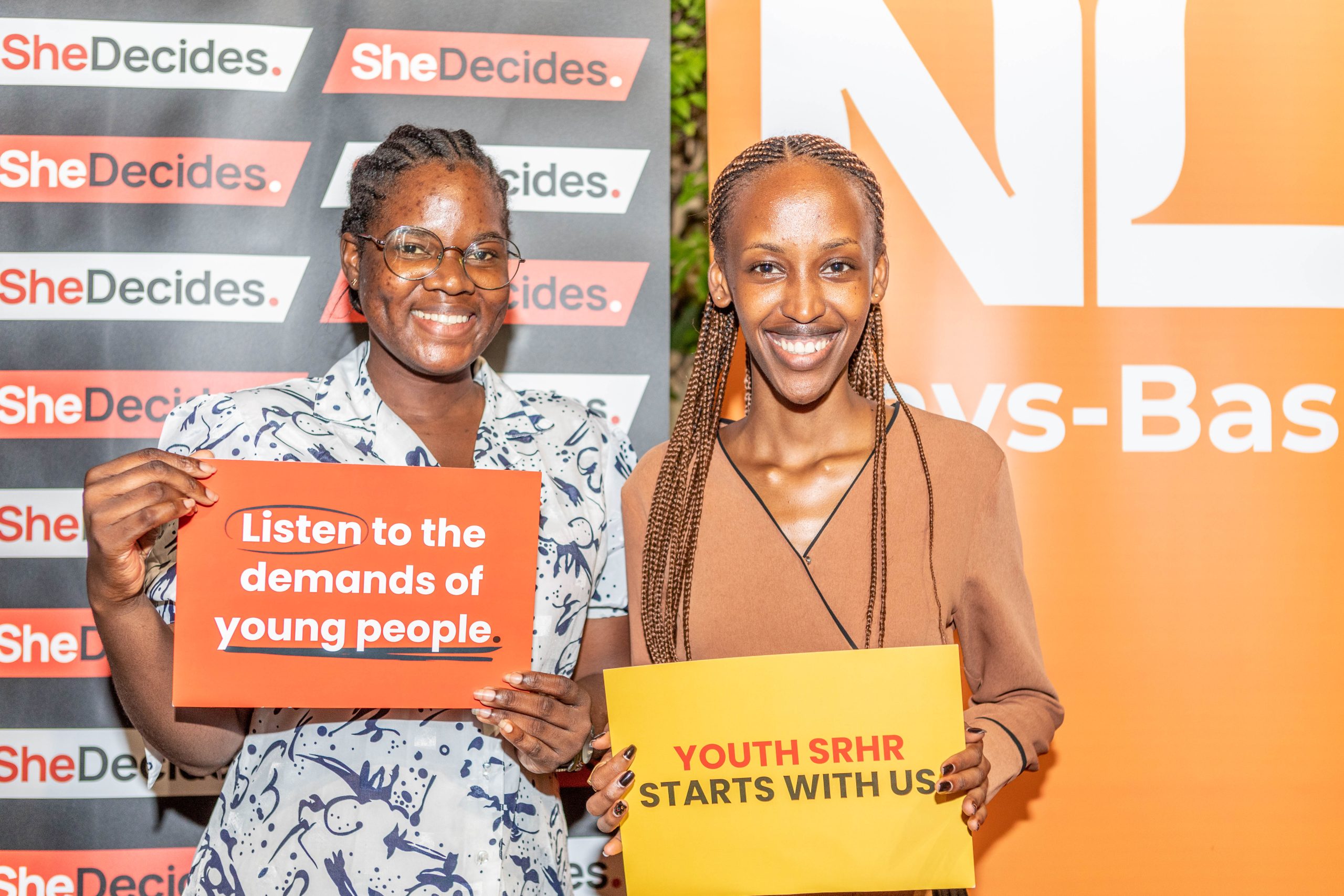What’s the state of SRHR for young people in Rwanda?
30th May 2024
Diana Keza (pictured below, on the right) is Head of Capacity Building at AfriYAN Rwanda, a Plan International youth advocate and a member of SheDecides Youth Advisory Panel. We asked her about the youth SRHR landscape in Rwanda.
SheDecides: Diana, can you tell us a little about the state of youth SRHR (sexual and reproductive health and rights) in Rwanda? In particular, what more do you think needs to be done to include young people in SRHR decision making in Rwanda?
Diana: In Rwanda, there have been some steps taken to include young people in decision making in general. But for SRHR, they also need to be included in research, validation and monitoring of how certain initiatives are working. Another important aspect is capacity building of young people in rural areas, who don’t have the same privileges that the youth in the city have.
Addressing the barriers that young people face, mostly related to societal norms and stigma, could help youth to participate more, be free, share their ideas and develop the SRHR sector in general.

SheDecides: Could you tell us more about these norms that act as barriers for young people taking part in SRHR decision making?
Diana: Young people are often perceived as if we have a lot going on in our lives, that we are not focussed, and that we don't really know what we want. So, when we give out our ideas, it's sometimes regarded as if ‘you haven't reached this adult level’ to fully contribute.
As a young person, I understand what I want, and I would participate fully if I knew that my opinions were truly valued. So, this thing of stigmatising us and making us feel like our opinions are not equally valid is something that is all around and socially, it hinders the youth’s participation because they know at the end of the day, ‘I will just participate, and it will end there as the decisions are already made.
SheDecides: How accessible is CSE in Rwanda?
Diana: CSE in Rwanda has made some strides forward because it has been incorporated in the school curriculum and in fact, just now, I came from a workshop where we were reviewing the second edition of the course. CSE is recognised by the Rwanda Education Board, which is part of the Ministry of Education, and it is being incorporated in high schools - at the ordinary level and the advanced level - but there are still some issues regarding the evaluation of it, because it's a curriculum that is included in already existing subjects.
One challenge is that it is really hard to evaluate how effective it is, and there's also some issues around the training of teachers. If it was taught in the teacher training colleges, it would mean that every teacher would have accurate knowledge. We are still finding ways in which CSE can be a sustainable solution.
SheDecides: 30 years on from ICPD, what would you say is the state of SRHR in the country?
Diana: Here, ICPD gained more recognition after the 2019 ICPD in Nairobi because that is when the commitments for Rwanda were created. It’s had an impact on the country because we have seen some changes around increasing the budgetary allocation and decreasing maternal mortality rates. There are some challenges that still remain in accessing quality healthcare – particularly for the youth’s access to SRHR services. There is still stigma and a lack of proactive initiatives that respond to SRHR needs for the youth. I would also say that we are seeing a lot of awareness-raising, but at the same time, seeing a high rise of teenage pregnancies, so tackling the issues from the roots is still something that is being worked on, but progress has been there. There are some aspects in regard to SRHR that need a little bit more work.
SheDecides: Could you tell us what those aspects are, the ones that need more work?
Diana: It comes down to CSE, addressing the issues of teenage pregnancy and gender-based violence. Tackling them holistically can help SRHR for everybody.
I believe that if everybody has information and access to quality and affordable services, we can come from one point to another. Since 2019, some issues have been addressed, but we still have some persisting like gender based violence and teenage pregnancies. These issues require everybody to work together - the government, development partners, and different implementing partners.
SheDecides: What are you most proud of in your work at AfriYAN Rwanda?
Diana: At AfriYAN Rwanda, we work with different youth organisations, and I would say that I am most proud of the work we do to empower young people so that they can become active agents of change in SRHR.
Like our community youth forums where the youth come together and discuss some of the critical issues that they are facing, and then brainstorm possible ways in which they can solve them. It starts with them asking themselves what role they can play in addressing those issues. Because some issues are actually beyond their limits, we have provided a proper route which they can pass through across the different administrative levels in Rwanda.
We all know that young people are really capable. It's a matter of showing and building their capacity so that they can take action in an effective and sustainable way.

